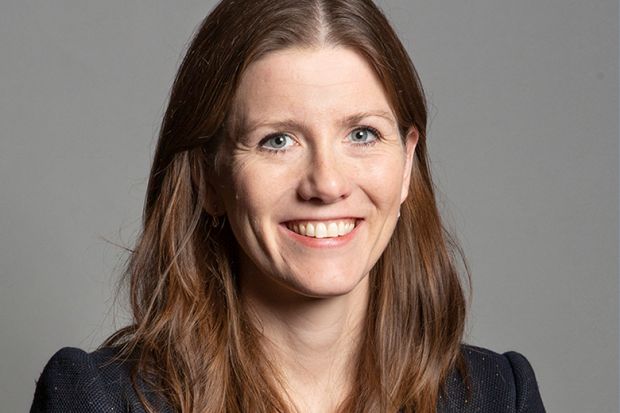Universities minister Michelle Donelan has said that she wants to “bust this myth” that the government will cut tuition fees in England to £7,500.
Reports have suggested that the Treasury is keen to implement one of the key recommendations of the Augar review of post-18 education and to reduce the fee cap from its current level of £9,250.
The proposal is seen by some in Whitehall as a way of reducing the government’s outlay on student loans that are not repaid, a goal that has been given added impetus by the plan to introduce a lifelong loan entitlement, allowing adults to access funding for modular-level study and retraining throughout their careers. There are concerns that this could lead to a significant increase in the value of loans that are written off.
Following a keynote address at GuildHE’s spring conference, Ms Donelan was asked by Times Higher Education whether a cut in tuition fees was a necessary accompaniment to the introduction of the lifelong loan entitlement.
“I just want to bust this myth,” Ms Donelan responded, describing reports of a fee cut as a “media story” that “has not been issued by the government”.
Sector figures expect a consultation covering fees and funding in early June, alongside consultation on a minimum entry requirement for university study and changes to student loans terms and conditions.
But on the question of a fee cut, Ms Donelan said: “We haven’t made any such announcement; we aren’t consulting on this. We have always said that we will respond to the rest of Augar at the spending review in the autumn.”
Ms Donelan’s comments may reflect in part divided opinion within Whitehall, with the Treasury seen as driving forward proposals to cut fees and greater uncertainty over the Department for Education’s position.
At the GuildHE conference, Ms Donelan was also quizzed about the planned Higher Education (Freedom of Speech) Bill and, in particular, whether it would allow Holocaust deniers to speak on university campuses.
The issue is a potentially difficult one for the government because it has made strident efforts to make all English universities sign up to the International Holocaust Remembrance Alliance definition of antisemitism and to take action against antisemitism on campuses more broadly.
However, as Holocaust denial is not illegal in the UK, there have been suggestions that universities and students’ unions could face claims for compensation if they do not allow people holding these views to speak.
Ms Donelan indicated that this was not the case. “Universities will not be placed in a position where they are asked to protect a Holocaust denier,” she said.
The minister emphasised that universities had to balance taking “reasonably practical steps” to allow free speech with their existing responsibilities under the Prevent duty and legislation such as the Equalities Act, and said that Holocaust denial was an “extremist” view that could lead to “harassment”.
“The free speech bill isn’t a right to a platform. It doesn’t mean a university should have to invite such a speaker,” Ms Donelan said. “I would argue no university should be inviting a Holocaust denier because it’s such an extreme and dangerous viewpoint.”
Ms Donelan also rejected concerns that the government was shifting too far towards judging graduate outcomes based on salaries alone, emphasising the social value of courses such as nursing and teaching, and claiming that she would be a “champion” of arts courses in the sector.
However, she added, universities needed to ensure that graduates went on to careers that they would not have been able to pursue without a degree.
Register to continue
Why register?
- Registration is free and only takes a moment
- Once registered, you can read 3 articles a month
- Sign up for our newsletter
Subscribe
Or subscribe for unlimited access to:
- Unlimited access to news, views, insights & reviews
- Digital editions
- Digital access to THE’s university and college rankings analysis
Already registered or a current subscriber?








